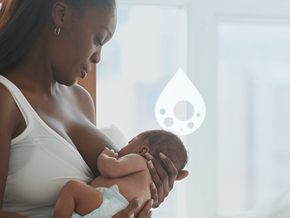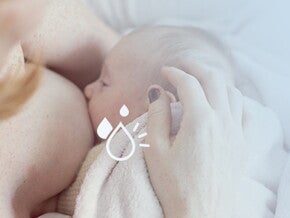
Is Your Baby Getting Enough?
Is Your Baby Getting Enough?
While new babies need to feed every 2-3 hours, there really is no such thing as a set baby feeding schedule. Watch this video to learn about hunger and fullness cues to look for and how much to feed a newborn.
Related articles

What Support is Available If I've Decided to Formula Feed
There are many parents out there just like you, who have for whatever reason, decided not to breastfeed, and given this is to be an unlikely easy decision, it’s important to know what support is th
2 mins to read

How to Use Expressed Breast Milk for Bottle-Feeding
Bottle-feeding does not mean an end to breastfeeding. It may just be another means for your baby to continue to receive full nutrition in the form of expressed breastmilk.
4 mins to read

How Much Milk Should a Newborn Drink?
Newborn babies will drink as much as they need when they are hungry. They are usually quite good at regulating their intake and stop drinking when they feel full.
6 mins to read

Postpartum Freezer Meals: Healthy Meal Prep Ideas for New Mums
By Marika Day, Accredited Practising Dietitian and Nutritionist with over a decade of experience in the areas of women’s health, gastrointestinal nutrition and disordered eating.
8 mins to read

Breastfeeding Snacks
Breastfeeding is a rewarding but demanding journey, and good nutrition is crucial for both you and your baby.
8 mins to read

How Many Kilojoules Do Mums Who Breastfeed Need?
It’s no surprise that your energy and nutrition needs go up when you’re breastfeeding. Choose healthy foods and beverages to get the extra kilojoules and nutrients you both need.
2 mins to read

Breastfeeding 101
Having a basic understanding about breastmilk, breastfeeding and your breastfed baby will help you enjoy every moment that you’re nourishing and nurturing your baby.
4 mins to read

Breastfeeding Diet & Food to Avoid When Breastfeeding
Breastfeeding requires approximately 2000-2100 kilojoules extra each day compared with if you were not breastfeeding. This is a lot of extra food (and fluid) to fit in!
11 mins to read

Warming Baby Formula
There may not be many situations where you will need to warm up a formula feed, but on the odd occasion when you do it’s important to know how to do it safely.
2 mins to read

Storage and Handling of Baby Formula
It is extremely important to follow the storage and handling instructions provided on the tin of the baby formula you are using.
1 min to read

Formula For Newborn Babies
Baby formula is usually split up into two categories according to your babys age.
2 mins to read

Baby Formula Feeding Concerns
Most formula fed babies will be very happy on the baby formula you first choose. However, it’s important to know that not all formulas suit all babies.
7 mins to read

Special Baby Formulas
Formulas for lactose intolerance, regurgitation, and allergy management are some of the infant formulas available for formula fed babies with special dietary needs.
4 mins to read

How to Prepare Baby Formula
Safe preparation of baby formula is important for your baby’s health. Like any food preparation we need to consider good food hygiene practices - it doesn't need to be complicated.
5 mins to read

Guide to Baby Formula
Explore our guide to baby formula and learn more about the difference between newborn formula and stage 2 formula.
5 mins to read

Baby Formula Ingredients
Baby formulas will never be equal to breast milk, however they have been formulated to provide the necessary nutrients to support normal growth and development when breast milk is not available.&nb
4 mins to read

Transitioning Between Different Milk Feeding Options
Whether you’re moving from breastfeeding to formula feeding, or changing from one formula to another, it’s important to keep your eye out for signs of intolerance.
2 mins to read

Breast Milk Is The Best Start For Babies
Amazingly, the nutrients in breastmilk continuously change to match the growth and development of a baby throughout its infancy.
1 min to read

Breastfeeding for Beginners PART 1: Get Started
Like any new skill, breastfeeding can take practice and perseverance to master.
4 mins to read
Related FAQ's
Why is Breastfeeding Important?
Breastfeeding FAQs
Breastfeeding is nature’s intended way of feeding your baby. The benefits are quite extensive and long lasting. To name but a few, it provides the ideal nutrition for healthy growth and development, it contains other unique ingredients such as probiotics and prebiotics to support your baby’s immune and digestive health, it creates loving bonds with your baby, assists with returning to your pre-pregnancy weight, it has financial savings…really this list goes on.
How Many Calories Does Breastfeeding Burn?
Breastfeeding FAQs
Breastfeeding requires approximately 500 calories (2000 kilojoules) extra each day compared with if you were not breastfeeding. This extra allowance is to ensure that you meet the extra energy needs to sustain your breast milk supply. As your body requires this extra energy to produce breast milk, if you are not consuming these calories through your diet, your fat stores from pregnancy will help cover these needs.
Can You Drink Coffee When Breastfeeding?
Breastfeeding FAQs
It is known that caffeine does pass through into your breast milk. As caffeine is a stimulant and may affect your baby, it’s important to limit your intake while breastfeeding. Drinking small amounts, less than 200mg/day should be ok. 200mg is equivalent to approximately 1 espresso; 2 instant coffees; or 4 cups of tea. If you’re re-introducing coffee after your pregnancy you may want to start back slowly and monitor for any signs of unsettledness in your baby.
